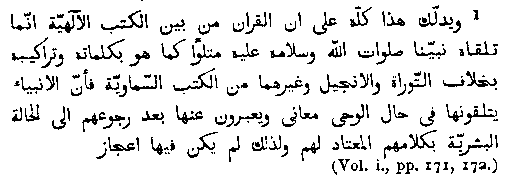2 Vide pp. 119, sqq.
3 This word is generally, but wrongly, spelt Caliph.
It is applied to Muhammad's successors, and means ''Vicegerent (of the Apostle of God)."
4 Mishkatu'l Masabih, pp. 185 sqq., from Bukhari.
5 The Surahs are arranged as nearly as possible in
chronological order in Rodwell's translation of the Qur'an, though doubtless certain
early Surahs had verses of later date inserted into them long after they were written.
See Canon Sell's "Historical Development of the Qur'an."
6 Mishkatu'l Masabih, pp. 185, 186.
7
8 See the objections stated in Al Kindi's Apology,
Sir W. Muir's translation, pp. 72-8.
9 A few examples of such various readings occur in Surah VI., Al An'am, 91.
10 Called the "Night of Power".
11
12
13 Cf. Surahs IV., 84; XVII., 107; XLVI., 7; LIII., 4; &c, &c.



